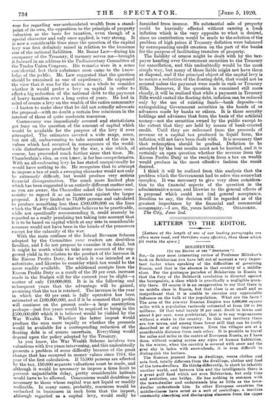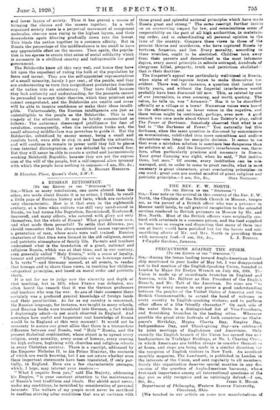LETTERS TO THE EDITOR.
[Letters of the length of one of our leading paragraphs are often more read, and therefore more effective, than those which fill treble the space.]
BOLSHEVISM.
[To THE EDITOR OP THE " SPECTATOR."] Sin,—In your most interesting review of Professor Miliukov's book on Bolshevism you have left out of account a very impor- tant factor when speaking of the difficulties of governing Russia, and that is the absence in that country of a middle- class. For the grotesque paradox of Bolshevism in Russia is that the fury of the Bolshevik revolution is directed against the bourgeoisie, a class which is practically a negligible quan- tity there. Of course it is an exaggeration to say that there is no middle class in Russia, but that class is so small and so insignificant that it is unable to exercise any appreciable influence on the bulk of the population. What are the facts ? The area of the pre-war Russian Empire was 8,660,000 square miles with a population variously estimated at from 150 to 180. millions. Of that total barely 10 per cent. dwelt in towns and about 5 per cent. were proletariat, that is to say wage-earners without a stake in the country. In this vast territory there are few towns, and among these fewer still that can be justly described as of any importance. Even the villages are at a considerable distance from each other. It is possible to travel for miles and miles in the centre of European Russia, as I have done, without coming across any signs of human habitation. In the winter, when the country is covered with snow and the grey sky is laden with snow-clouds, it is even difficult to distinguish the horizon.
The Russian peasant lives in dwellings, wears clothes and eats food, totally different from the dwellings, clothes and food of the town-dwellers. He think differently, in short he inhabits another world, and between him and the intelligenzia there is a great gulf fixed which not even Bolshevism, but only time and evolution, can bridge. He has nothing in common with the town-dweller and understands him as little as the town- dweller understands him. In other European countries the middle-classes have acted as a sort of centrifuge, a machine constantly absorbing and discharging elements from the upper
and lower layers of society. Thus it has proved a means of bringing the classes and the masses together. In a well- organized society there is a perpetual movement of component molecules, obscure men rising to the highest layers, and their descendants again filtering gradually down into the lowest. This binds the nation together in a common affinity. But in Russia the percentage of the middle-classes is too small to have any appreciable effect on the masses. Then again, the popula- tion is too sparse to create that sense of social solidarity which is necessary in a civilized country and indispensable for good government.
The Bolsheviks know all this very well, and hence they have hit upon the expedient of ruling the bulk of the population by force and terror. They are the self-appointed representatives of a small minority, barely 5 per cent., of the people, and they are endeavouring to turn this insignificant proletarian fraction of the nation into an aristocracy. They have failed because they lack authority and understanding, for the peasants cannot be persuaded to accept their theories, which they mistrust and cannot comprehend, and the Bolsheviks are unable and never will be able to inspire confidence or make their ideas intelli- gible. Unfortunately, the Russian intelligenzia are just as unintelligible to the people as the Bolsheviks. This is the tragedy of the situation. It may be briefly summarized as follows: The autocracy discouraged intelligence for fear of revolution, consequently, when the revolution broke out, the small educateki middle-class was powerless to guide it. But the Bolsheviks, subsidized by enemy money, being a small and resolute band, were able to step in and handle the situation, and will continue to remain in power until they fall to pieces from internal disintegration, or are defeated by outward foes. Bat they will never be able to create a united and harmoniously working Bolshevik Republic, because they are not the expres- sion of the will of the people, but a self-imposed alien tyranny with which the people have nothing in common.—I am, Sir, &c.,



































 Previous page
Previous page